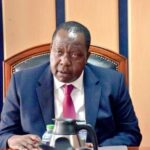
What is the role or duty of the church in society?
Let’s start from the biblical point of view. And then we look at the history of the church in politics, but we also look at our modern times.
When God raised a king, there was always a prophet and vice versa in the Bible, and it tells you about the place of power, religious and political, which is very important in influencing the daily happenings of society.
And the reason why God did that was to have a balance between political power and religious power, without which one can be toxic or excessive.
But now the challenge is when the two come together and collude. Then it becomes what I have said in other forums: occultic, and it’s dangerous. So the church requires political regulation.
But politics requires religious regulation, and even looking at the history of the church and politics, where the church has become part of the government, it becomes very dangerous; it becomes part of the oppressor because the government can be oppressive, but also where churches have not been regulated, there is no difference between religious or political power when it is not under control. And that’s why we speak to one another; we regulate one another.
Has this been the case with our governments?
Kenya has many examples from different dispensations.
The Kenyatta era demonstrates the distinction between the church and the government, as well as the role that the church played. Looking back at the Moi era, some churches were deemed to be too close to power, and they reaped the benefits. While there are others, such as where I come from, where people suffer and die, it has become the only source of agitation and the pursuit of freedom.
Then, in the Kibaki era, he was open to the church but independent of it at the same time. Now, in the Uhuru era, we grappled with problems that I knew about, and I was in the studio speaking about them.
And now the new one and the challenges that have come, so church and politics or challenges or using the new one, you know, and this began during campaigns where one leader was made to look like an angel like the Messiah, a Christian, and the Lord’s anointed. And so that was the wave on which he came into power. What he would call the evangelical tide
And then you have the other person who was made to look like the devil, anti-church, anti-Christ, the enemy of the church, and that is very dangerous when charging labels because it stigmatizes people. So somebody comes into power, and then, feeling entitled, there is easily a mix of political and religious powers, definitely to the benefit of both.
And that’s where I have said, “Hey, that is not right.” Step out. The church should be close enough to commend where people do well, but also find them and tell them what is wrong. Something happens when you bring the two back together to say the word “cultic” again. And cultic power is very dangerous because when it comes from one person who is too powerful to influence you, the word becomes the law. When you challenge this, you are viewed as an enemy of the establishment.
How is that?
Well, it’s also good to understand when we talk about the church because the church is not one denomination. But the church is organized in such a way that you have bodies that are regulated. You have the NCC-K, the EAK, and the Catholic Bishops Conference; all of these are very important bodies, and if you wanted to engage with the church, you would use such forums to engage with the church.
But when the government takes a certain religious persuasion, it’s like being here again and knowing that I can speak openly. I have never been invited to those meetings. And where somebody is sent to ask me to come and be part of the congregation, I have asked them. So what is the agenda on the table? What am I coming to do? I represent a church in the city and a significant church at that. So you can’t just tell me to come and attend.
I won’t mobilise people for something where I don’t know what kind of meeting I’m getting the church into.
What are the planning meetings for?
Well, mostly it’s not the planning meetings. Most of all, we are meeting in this stadium, and please, could you come or mobilise members to come? And I said, “No, I can’t do that.” And why not? You are not involved in the planning because I don’t know what is on the table. What are we committing ourselves to? If members of the cathedral asked me, “What is the purpose of the sudden prayer?” And in Kenya, we need to be careful with our prayers of fellowship or thanksgiving because they are not religious acts per se. They are political tabs.
For example, we had a nationa prayer in Nakuru…
What do you mean by “national”?This was called a national prayer. If I had been invited, no, I wouldn’t have gone. If it doesn’t rain, does that mean Kenya is not a godly country? We should pray, and we can pray. I’ve been in public, and I’ve said that if you want to pray, ask the churches to pray on Sunday. I do pray across the country, across all denominations.
As the political leadership joins, ask the church to organise the prayers. It is not the government’s responsibility to organize prayers.
But now look and let us know about the Nakuru rally, for example. It’s a four-hour period of prayer and thanksgiving. Then you use an hour to do the sermon. Then after that, the hours are political and do the same sermon, and then the clergy are there seated and entertained. Even one of them suggested revenge. He said even if it means arresting me and putting me in prison so that by the time you get this guy, I’ll be able to deal with him.
Oh, I wouldn’t be there. I will walk out or I’ll go to the podium and say it is either a prayer meeting or a political meeting.
It sounds to me like there is a distinction between these two clearly defined denominational divisions in the church…
When we are talking about national issues, the church is structured. Even all those churches like that are owned by individuals, and they are under an umbrella body.
That is where we need to structure the church because if we don’t regulate ourselves through those parts, the government will likely come back and do what happened in Rwanda because of the chaos that religion in the name of God can create. People can cause a lot of chaos. Now, the churches that we are calling—and, once again, I don’t want to emphasize the divide between evangelical and Pentecostal—may never have been very close.
If that is clear in terms of potential danger, then why do we see the continuation of this?
Well, you know, history also mutates and changes, whether it’s the history of the church or politics. And, as in Kenya’s history, the main churches, or what you’d call the mainstream, play an important role, and perhaps that’s where we learned. Hey, too far, too bad. Too close. Unfortunately, both are true. So it’s like we need one another, but let’s be careful.
We have fluidity in terms of relationships. But there is also power in recent times for people to coexist. With the growth of the evangelical movement, one man or a few people led the type of congregations that are not regulated in such a way that one divides into another and, within a short time, you have 100 congregations out of one.
That’s where the main problem now lies. How do we get to regulate these churches?
Even in terms of theology, you see, we have formed that theology through experience. This time, as you’re referring to, we’ve developed a strong theology based on our experience as, say, mainstream churches. Hey, be careful about this.
But anyway, Kenya is a free nation if people want to associate with the powers that are there. We let them enjoy the shine, but some of us will say no.
At what cost to the people who follow this, as well as the lives of Kenyans who rely on churches to act as a buffer between the wrongs committed by the state?
But who benefits from this trade between the church and their political leadership? Which commodities are they trading? which are the members, and so you tend to see pastors who are very rich and very powerful, very close to the political powers, but they have very poor members. And they have no voice.
The church should call out the government because it tends to be corrupt.
It’s dangerous when that same corruption is now in the church leadership; it becomes very dangerous, and it’s argued elsewhere that that doesn’t encourage the growth of Christianity because people need to become disillusioned about faith. But also, because of poverty, Kenyans cannot receive good services because of politicians who can do anything without question.
If you collude as opposed to providing the service that they are calling for, then this problem keeps rising. The fact that the checks and balances that we speak of are not as evident as they ought to be…
But there are very different layers to a leader’s right, and what he’s talking about is speaking truth to power. So we speak truth to power to the National Executive. We also need to speak truth to power to the legislators, who also have a mandate from the people and the job of speaking truth to governance.








